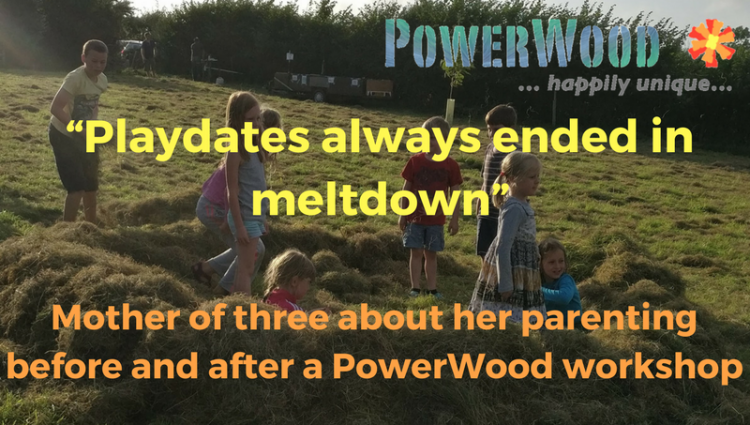Children’s names have been changed
Tell us about how OEs have affected your family
All three of my children (now 10, 8 and 6) have OEs to varying degrees.
Naturally, our steepest learning curve was with our firstborn. Right from the start I noticed that Laura was very sensitive and didn’t like changes in her routine. When she was about five we moved to a new area. Because we home-educate I felt pressure to integrate into the local community, but playdates were a nightmare.
Laura has such a powerful imagination, her toys are alive to her – they even have a particular way of speaking and behaving. Laura found it really difficult to share them when other children visited. Visits to other people’s house were no easier. Laura struggled to cope with a strange new environment and the other mother (even if the mum was very kind). When Laura would enter another child’s room, she’d see all these Barbies or Sylvanian Families, and struggle to scale back her imaginational response and play nicely alongside the other child.
Meanwhile, I’d be busy trying to meet the needs of my two younger boys and be friendly with the other mum, all the while dealing with my own OEs, so I just wasn’t able to give Laura the support she needed. Unsurprisingly, playdates usually ended in meltdown and disaster. Looking back, I can see that I had painfully unrealistic expectations.
These days we’re much better prepared. If we have visitors, we prepare by putting away certain toys, because we know it would be painful for them to be touched or moved.
My youngest son Freddie (6) is also easily triggered. Yesterday we travelled up to London to stay with family. We did lots of things Freddie likes – going on the train, spending time with his cousins, visiting a little hands-on museum, going to the cafe etc. But over the course of the day all these things that are nice on their own build up. Suddenly (it seems) everything’s just too much, and something as simple as me trying to put Freddie’s coat on as we’re leaving the train triggers a volcanic explosion of kicking and shouting. Of course by that point I’m tired too, so my responses aren’t always appropriately scaled either!
My middle son (8) also feels things keenly, but whereas his brother and sister both explode, Noah implodes. He feels others’ sadness or anger very keenly. If his little brother’s being difficult, Noah will try to appease Freddie and sort things out. Because he is so aware of and affected by others’ emotions, as well as his own, he can’t just think, “Freddie’s being a pest” and walk away.
How did you come across PowerWood?
I’ve always found the ‘gifted’ label problematic, but it did lead me to some useful information about asynchronous development. My daughter was intelligent and intense, and asynchronous development explained a lot of what we were struggling with, but still some things were unexplained.
Then Google led me to the PowerWood website, which seemed to pull everything together. Seeing all the information about OEs there in black and white, and later hearing everything explained by Simone at a PowerWood Workshop, helped me make sense of what was going on in our family.
What’s the hardest thing about parenting children with OEs?
For me it’s feeling what your children are feeling but doubting the extent to which I need to be soothing them, or shielding them, or complying with society’s expectations. I think the very hardest thing is confronting my own OE in my responses to my children.
When my youngest son was a baby, a group of other home-educating families used to visit us regularly. I’d feel fairly comfortable with them, but Laura would regularly get very overwhelmed at certain points during their visits. Eventually two of the other mums told me – not kindly – that I wasn’t giving Laura clear enough boundaries. That was a difficult time for me because I lost the practical support of those friendships and also their criticisms chimed with the feeling of unacceptability I’d carried throughout my own childhood, of always wanting to fit in and do the things that were asked of me, but not being able to.
How has PowerWood helped?
PowerWood’s Workshop has given me the information and tools I was looking for and, most importantly, it’s given me peace and strength. The process of releasing expectations has sometimes been painful, but I’m gradually finding acceptance. It’s a case of finding a way to live with the practical implications of everyone’s imaginations and emotions working overtime, so that there’s less struggle and more happiness.
Through PowerWood I’ve learned how powerful physical contact can be in helping calm down my son when he’s going ballistic. And I’ve found the communication model very useful – it really helps to engage my son’s intellect when he’s gone off on an emotional rant. With my daughter, I’ve been able to show her how she’s the generator of her imagination, which means she can find some control over what she’s imagining, even her bad dreams.
What would you say are the positive aspects of your children’s OEs?
My daughter has a deep understanding of how other people think and feel, even though she can’t yet always act appropriately on that knowledge.
All my children really enjoy life. I love how their enthusiasms are so sincere and deeply felt. The sensitivity that causes so many problems also makes them creative and caring and gives them a fantastic sense of fun, humour and pleasure. My youngest son told me yesterday as he was eating a piece of chocolate cake at the museum, “This is the happiest day of my life!”.
Interview by Lucinda Leo

